News & Announcements
- Details
- Written by Laura Mirsky
This piece, by Laura Mirsky, the IIRP's assistant director for communications, was published originally by Educational Leadership Magazine, Summer 2014, Association of Supervision and Curriculum Development (ASCD). Download a pdf of the article from Educational Leadership.
When schools use restorative practices to build relationships and community, students’ attitudes change for the better.
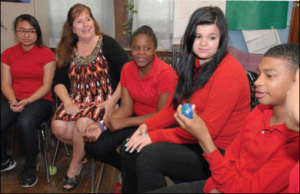 Students at Warren G. Harding Middle School in Philadelphia use a “talking piece” to indicate whose turn it is to speak during a restorative circle facilitated by teacher Denise James. (Photo by Danielle Marie Phil.)In April 2014, students at Warren G. Harding Middle School, in Philadelphia, Pennsylvania, had just finished a week of state testing, which they had found very stressful. Like all Harding’s teachers, 7th grade language arts teacher Denise James had her students sit in a circle and discuss the purpose of the tests and how they felt about having to take them.
Students at Warren G. Harding Middle School in Philadelphia use a “talking piece” to indicate whose turn it is to speak during a restorative circle facilitated by teacher Denise James. (Photo by Danielle Marie Phil.)In April 2014, students at Warren G. Harding Middle School, in Philadelphia, Pennsylvania, had just finished a week of state testing, which they had found very stressful. Like all Harding’s teachers, 7th grade language arts teacher Denise James had her students sit in a circle and discuss the purpose of the tests and how they felt about having to take them.
- Details
- Written by Joshua Wachtel
Higher Education
Higher-ed student conduct professionals are encouraged to attend the Association for Student Conduct Administration (ASCA) webinar on Restorative Justice in higher education, with the IIRP's Steve Korr, Michigan State University's Rick Shafer and Washington University in St. Louis's Molly Pierson.
- Details
- Written by Joshua Wachtel
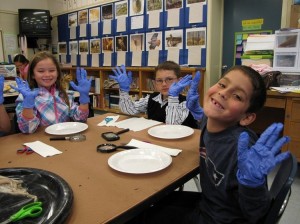 Students pose during "Squid Dissection Day" at Two Rock Elementary School, where Mike Simpson is currently superintendent and principalBack in the late 1990s, Mike Simpson, then a middle school administrator in South Burlington, Vermont, pioneered the use of Real Justice restorative conferences in schools. He also trained to be a trainer with the IIRP. At the time, the state of Vermont was experimenting with new ways to administer justice (see last month’s, “Serious Offenders Make a Change,” for more on Vermont’s cutting edge restorative programs and history), and Simpson was involved not only in conducting restorative conferences, but was training teachers, school counselors, DAs, state police and corrections officers to run them, as well.
Students pose during "Squid Dissection Day" at Two Rock Elementary School, where Mike Simpson is currently superintendent and principalBack in the late 1990s, Mike Simpson, then a middle school administrator in South Burlington, Vermont, pioneered the use of Real Justice restorative conferences in schools. He also trained to be a trainer with the IIRP. At the time, the state of Vermont was experimenting with new ways to administer justice (see last month’s, “Serious Offenders Make a Change,” for more on Vermont’s cutting edge restorative programs and history), and Simpson was involved not only in conducting restorative conferences, but was training teachers, school counselors, DAs, state police and corrections officers to run them, as well.
Recently Simpson got in back in touch to say that he had moved to the West Coast over a decade ago. He wrote, “RJ is beginning to get a toe-hold in Sonoma County where I work as a Superintendent/Principal” of Two Rock Elementary School in Petaluma, California. He is now in the process of helping to bring restorative practices to the 40 school districts of Sonoma County.
- Details
- Written by Joshua Wachtel
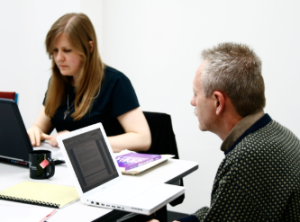 In keeping with the restorative ethos of including all stakeholders in decision-making, the IIRP Graduate School sent a survey to prospective students worldwide to learn the best ways to deliver its course content. The overwhelming response was that students wanted to learn restorative practices, but they wanted more online and low-residency options so they could continue to live and work at home while they studied. Nationally, too, the trend in higher education throughout across the U.S. is toward more online and hybrid education. As the IIRP has developed opportunities for students to study restorative practices at the graduate level wherever they happen to live, a world-wide network of restorative learners and practitioners is being fostered.
In keeping with the restorative ethos of including all stakeholders in decision-making, the IIRP Graduate School sent a survey to prospective students worldwide to learn the best ways to deliver its course content. The overwhelming response was that students wanted to learn restorative practices, but they wanted more online and low-residency options so they could continue to live and work at home while they studied. Nationally, too, the trend in higher education throughout across the U.S. is toward more online and hybrid education. As the IIRP has developed opportunities for students to study restorative practices at the graduate level wherever they happen to live, a world-wide network of restorative learners and practitioners is being fostered.
Fully online courses, including introductory courses like RP 506, Restorative Practices: The Promise and the Challenge, allow students to connect with others around the world on their own time schedule. IIRP students who have taken the course talk about the advantages of working with diverse participants from different fields and places as far afield as the Netherlands, Canada, the Caribbean, South Africa, the U.S., Australia and Peru.
- Details
- Written by Joshua Wachtel
“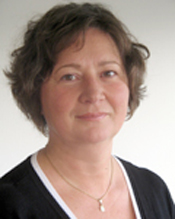 When they use restorative practices, professionals suddenly get back their self-esteem,” says Vidia Negrea, director of Community Service Foundation of Hungary (CSF Hungary), in Budapest. “They see how worthy their work can be.”
When they use restorative practices, professionals suddenly get back their self-esteem,” says Vidia Negrea, director of Community Service Foundation of Hungary (CSF Hungary), in Budapest. “They see how worthy their work can be.”
Negrea was appointed this month by the International Institute for Restorative Practices (IIRP) Board of Trustees as its newest member.
“I think of the IIRP as a restorative institution,” says Negrea. “The whole IIRP is a model of thinking and living in a restorative way. Even when the crises within politics and government make me very depressed, when I practice and people feel the effects of restorative practices, they start to regain their trust in themselves and the world.”
- Details
- Written by Joshua Wachtel
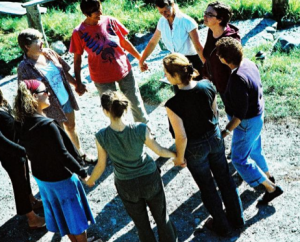 photo by Kris Krug at FlickrAcross the state of Vermont, nearly 50 serious offenders, who are considered high-risk to reoffend, are meeting weekly with small teams of volunteers who have signed on to hold them accountable for their past criminal behavior and to support them to become contributing members of society. These offenders have very little family and community support, and Circles of Accountability, or CoSAs, are formed around the released offenders to help them make the transition back to the community.
photo by Kris Krug at FlickrAcross the state of Vermont, nearly 50 serious offenders, who are considered high-risk to reoffend, are meeting weekly with small teams of volunteers who have signed on to hold them accountable for their past criminal behavior and to support them to become contributing members of society. These offenders have very little family and community support, and Circles of Accountability, or CoSAs, are formed around the released offenders to help them make the transition back to the community.
For Derek Miodownik, Community and Restorative Justice Executive for Vermont Department of Corrections (DoC), the main issue is how the justice system and corrections can help reinstate the social contract. On the one hand, the community needs to know that it will be safe from further harm. On the other hand, offenders need to understand the benefits to them of becoming rehabilitated citizens.
- Details
- Written by Joshua Wachtel
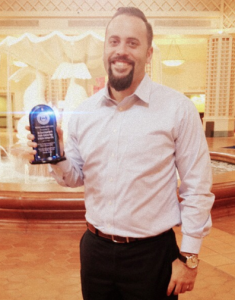 Dominique Smith, school social worker at Health Sciences High and Middle College in San Diego, California, received the National School Safety Award, presented by the School Safety Advocacy Council to his school, which was recognized for improvements made through the use of restorative practices.Schools
Dominique Smith, school social worker at Health Sciences High and Middle College in San Diego, California, received the National School Safety Award, presented by the School Safety Advocacy Council to his school, which was recognized for improvements made through the use of restorative practices.Schools
San Francisco Unified School District has cut suspensions by half with restorative practices, and continues to work on reducing the racial disparity gap. Plus, a podcast on restorative practices at SFUSD's Rosa Parks Elementary School and restorative justice in California prisons.
"The number of discipline incidents at St. Louis Park High School (Minnesota) has declined dramatically in the last five years ... according to Supt. Rob Metz. '[Restorative practices] has changed everything at the high school,' Metz said ... . “We’re passed the days of feeling obligated to do the consequence … If there’s any way to restore the relationship, we want that to happen."
- Details
- Written by Joshua Wachtel
Nicola Preston wears many hats, but they all involve restorative practices. She's a lecturer at the IIRP teaching online courses and a special education needs coordinator for a UK primary (elementary) school. She says that restorative practices have even made a big impact in her personal and family life.
- Details
- Written by Joshua Wachtel
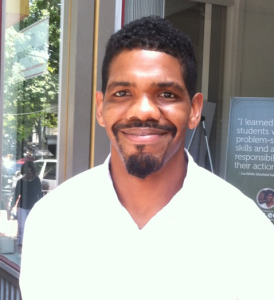 Educational associate Harik Cofer didn’t “buy into” restorative practices at first. “Why would I do that fluffy stuff?” In his position — similar to middle school assistant principal — at National Academy Foundation School, in Baltimore, he was focused on closing the achievement gap through curriculum and academics. “Little did I know that if I did the community building first I could exceed expectations.”
Educational associate Harik Cofer didn’t “buy into” restorative practices at first. “Why would I do that fluffy stuff?” In his position — similar to middle school assistant principal — at National Academy Foundation School, in Baltimore, he was focused on closing the achievement gap through curriculum and academics. “Little did I know that if I did the community building first I could exceed expectations.”
Cofer says his school is probably one of the better educational institutions in Baltimore City, but there are still plenty of problems. In particular, he laments the loss of feelings of pride and community kids used to have about school.
- Details
- Written by IIRP Staff
An invitation to students, parents, teachers and community organizations
Introduction to Restorative Practices – An Educational Workshop
Two dates: 8:30 am–3:30 pm, Saturday, August 16 or 8:30 am–3:30 pm, Tuesday, August 26
Location: John Bartram High School, 2401 S. 67th St., Philadelphia, PA 19142

Restorative Works Year in Review 2024 (PDF)
All our donors are acknowledged annually in Restorative Works.
